Duo Single Sign-On for Harness
Last updated:
Overview
As business applications move from on-premises to cloud hosted solutions, users experience password fatigue due to disparate logons for different applications. Single sign-on (SSO) technologies seek to unify identities across systems and reduce the number of different credentials a user has to remember or input to gain access to resources.
While SSO is convenient for users, it presents new security challenges. If a user's primary password is compromised, attackers may be able to gain access to multiple resources. In addition, as sensitive information makes its way to cloud-hosted services it is even more important to secure access by implementing two-factor authentication and zero-trust policies.
About Duo Single Sign-On
Duo Single Sign-On is our cloud-hosted SSO product which layers Duo's strong authentication and flexible policy engine on top of Harness logins. Duo Single Sign-On acts as an identity provider (IdP), authenticating your users using existing on-premises Active Directory (AD) or another SSO IdP. Duo SSO prompts users for two-factor authentication and performs endpoint assessment and verification before permitting access to Harness.
Duo Single Sign-On is available in Duo Premier, Duo Advantage, and Duo Essentials plans, which also include the ability to define policies that enforce unique controls for each individual SSO application. For example, you can require that Salesforce users complete two-factor authentication at every login, but only once every seven days when accessing Harness. Duo checks the user, device, and network against an application's policy before allowing access to the application.
Configure Single Sign-On
Before configuring Harness with Duo SSO using Security Assertion Markup Language (SAML) 2.0 authentication you'll first need to configure a working authentication source.
Once you have your SSO authentication source working, continue to the next step of creating the Harness application in Duo.
Create the Harness Application in Duo
-
Log in to the Duo Admin Panel and navigate to Applications → Application Catalog.
-
Locate the entry for Harness with the "SSO" label in the catalog. Click the + Add button to start configuring Harness. See Protecting Applications for more information about protecting applications with Duo and additional application options. You'll need the information on the Harness page under Downloads later.
-
No active Duo users can log in to new applications until you grant access. Update the User access setting to grant access to this application to users in selected Duo groups, or to all users. Learn more about user access to applications. If you do not change this setting now, be sure to update it so that your test user has access before you test your setup.
This setting only applies to users who exist in Duo with "Active" status. This does not affect application access for existing users with "Bypass" status, existing users for whom the effective Authentication Policy for the application specifies "Bypass 2FA" or "Skip MFA", or users who do not exist in Duo when the effective New User Policy for the application allows access to users unknown to Duo without MFA. -
Harness uses the Mail attribute when authenticating. We've mapped the <Email Address> attribute to external authentication source attributes as follows:
Default Attribute Active Directory SAML IdP <Email Address> mail Email If you are using a non-standard email attribute for your authentication source, check the Custom attributes box and enter the name of the attribute you wish to use instead.
-
You can adjust additional settings for your new SAML application at this time — like changing the application's name from the default value, enabling self-service, or assigning a group policy.
-
Keep the Duo Admin Panel tab open. You will come back to it later.
Duo Universal Prompt
The Duo Universal Prompt provides a simplified and accessible Duo login experience for web-based applications, offering a redesigned visual interface with security and usability enhancements.
| Universal Prompt | Traditional Prompt |
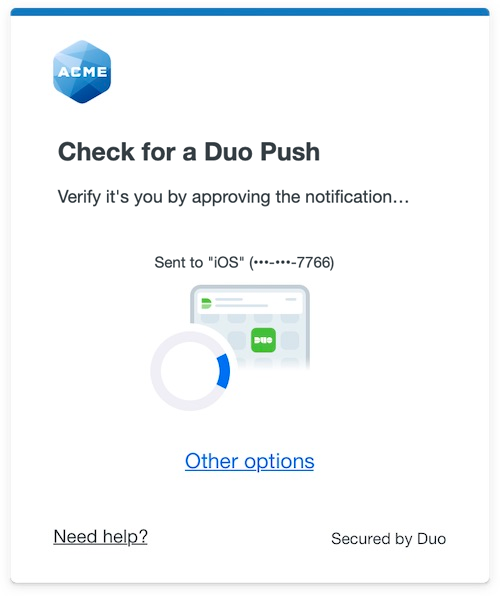 |
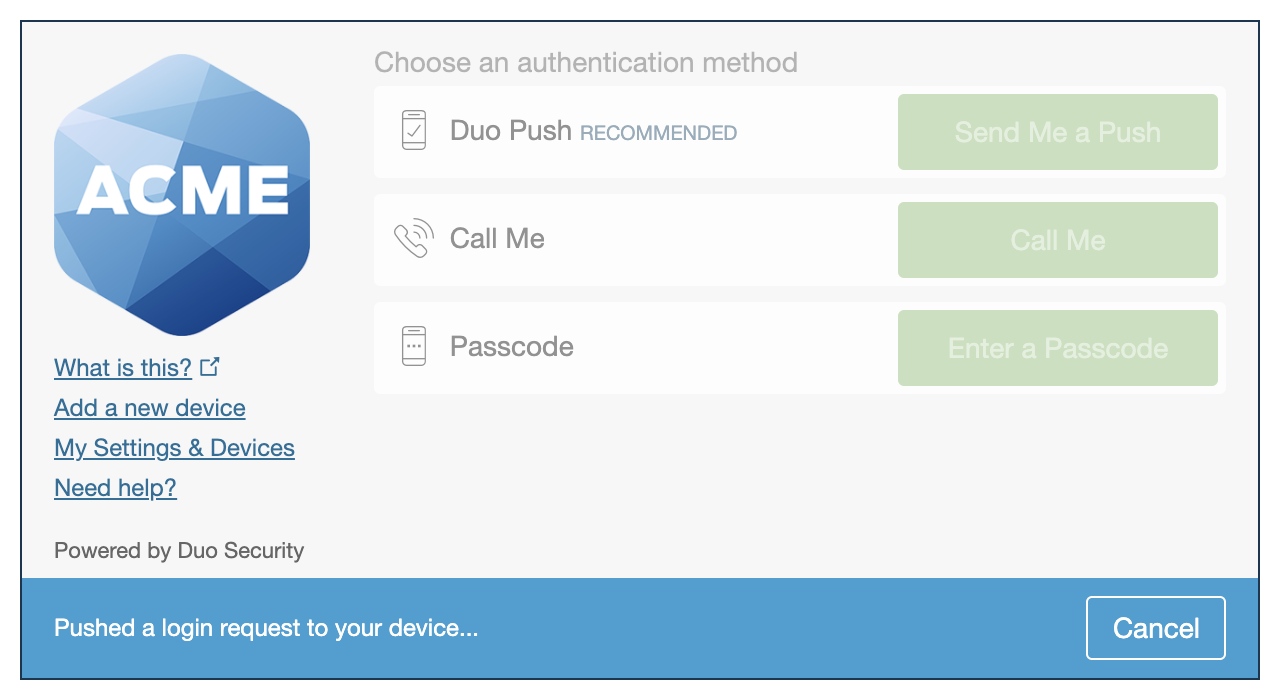 |
The Duo Harness application supports the Universal Prompt by default, so there's no additional action required on your part to start using the newest authentication experience.
Activate Universal Prompt
Activation of the Universal Prompt is a per-application change. Activating it for one application does not change the login experience for your other Duo applications. Universal Prompt is already activated for new Harness applications at creation.
The "Universal Prompt" area of the application details page shows that this application's status is "Activation complete", with these activation control options:
- Show traditional prompt: Your users experience Duo's traditional prompt via redirect when logging in to this application.
- Show new Universal Prompt: (Default) Your users experience the Universal Prompt via redirect when logging in to this application.
The application's Universal Prompt status shows "Activation complete" both here and on the Universal Prompt Update Progress report.
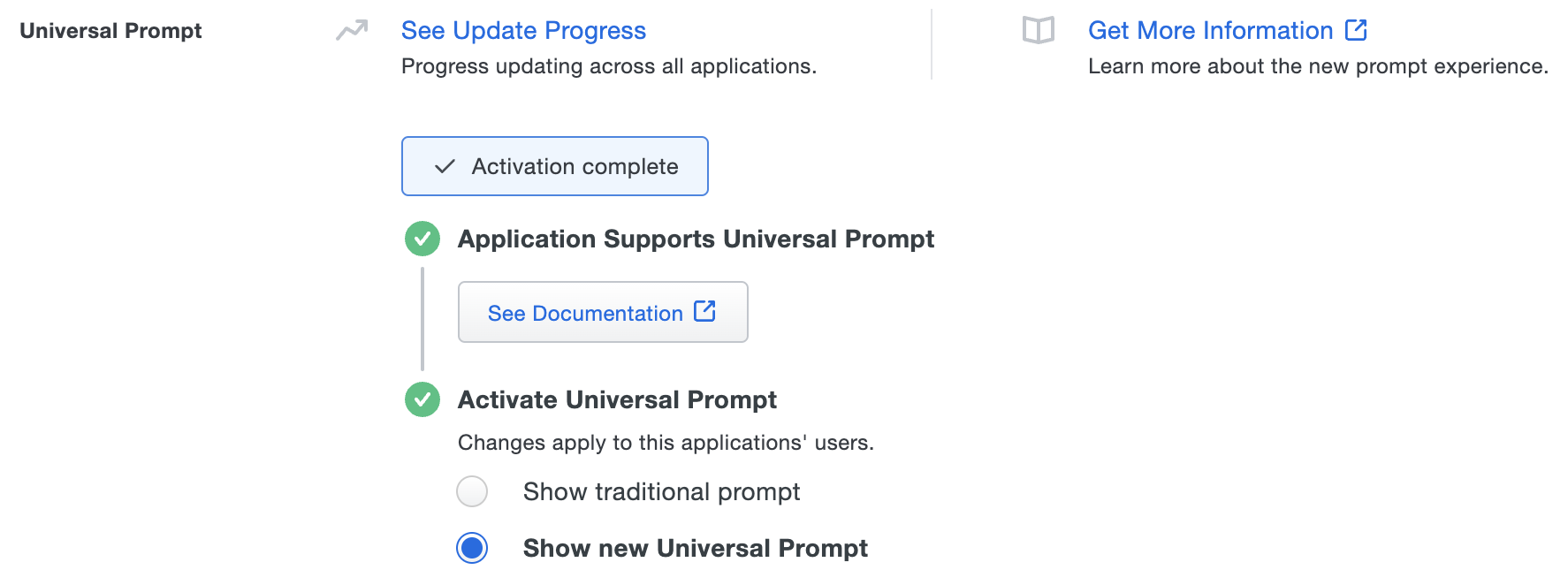
For the time being, you may change this setting to Show traditional prompt to use the legacy experience. Keep in mind that support for the traditional Duo prompt ended for the majority of applications in March 2024. This option will be removed in the future.
Universal Update Progress
Click the See Update Progress link to view the Universal Prompt Update Progress report. This report shows the update availability and migration progress for all your Duo applications. You can also activate the new prompt experience for multiple supported applications from the report page instead of visiting the individual details pages for each application.
Enable Harness for SSO
-
Log into your Harness account as an administrator.
-
In the sidebar menu, click Account Settings. The "Account Settings" page opens.
-
At the top of the page, click the Security and Governance tab.
-
Under "Security and Governance", click Authentication. The "Authentication" page opens.
-
Scroll down and click the + SAML Provider radio button. The "Add SAML Provider" pop-up window opens.
-
Enter a unique name for your SAML provider into the Name field.
-
Click the Other tile.
-
Copy the SAML Endpoint URL and paste it into the Duo Admin Panel SAML Endpoint URL, under "Service Provider".

-
In the Duo Admin Panel under "Downloads", click Download XML.
-
Scroll down to the bottom of the page and click Save.
-
Return to the Harness "Add SAML Provider" pop-up window. Click Upload and open the XML file you downloaded from the Duo Admin Panel earlier.
-
In the Harness "Add SAML Provider" pop-up window, make sure the Enable Authorization checkbox is checked.
-
Type group into the Group Attribute Name field.
-
Click the Enable JIT Provisioning checkbox.
-
Click Add.
Group Mapping
Mapping Duo groups to different groups in Harness is optional. To map Duo groups, do the following:
-
Log into your Harness account as an administrator.
-
In the sidebar menu, click Account Settings. The "Account Settings" page opens.
-
At the top of the page, click the Access Control tab.
-
Under "Access Control", click User Groups. The "Account Access Control: User Groups" page opens.
-
Click + New User Group. The "New User Group" pop-up window opens.
-
Enter a unique name for your user group into the Name field.
-
Enter the email addresses of your desired users into the Add Users field.
Note: You can also click the Add Users field and select your users from the list of existing users.
-
Click Save. You will return to the "Account Access Control: User Groups" page.
-
Locate your created user group in the "USER GROUP" column. In the "ROLE BINDINGS" column on your user group row, click Manage Role Bindings. The "Manage Role Bindings" pop-up window opens.
-
Under "Role Bindings", click + Add.
-
Click the drop-down menu under "Roles" and select your desired role.
-
Click the drop-down menu under "Resource Groups" and select your desired resource group.
-
Click Apply. You will return to the "Account Access Control: User Groups" page.
-
Return to the Duo Admin Panel. Under "Service Provider", enter your Harness group name into the Harness groups field.
-
In the Duo Admin Panel, click the Duo groups drop-down menu and select the applicable Duo group(s).

-
Scroll down to the bottom of the page and click Save.
-
Return to the Harness "Account Access Control: User Groups" page.
-
Click your created user group. Your user group page opens.
-
Click Link to SSO Provider Group. The "Link to SSO Provider Group" field opens.
-
Click the Search SSO Settings drop-down menu and select your SAML provider.
-
Enter your created user group name into the Group name field.
-
Click Save.
Learn more about Harness SSO at the Harness Developer Hub.
Using SSO
You can log on to Harness by navigating to your Harness SSO page e.g., https://app.harness.io/auth/#/signin. Click Single sign-on. Enter your email address and then click Sign in to be redirected to Duo Single Sign-On to begin authentication.
Active Directory Login
With Active Directory as the Duo SSO authentication source, enter the primary username (email address) on the Duo SSO login page and click or tap Next.
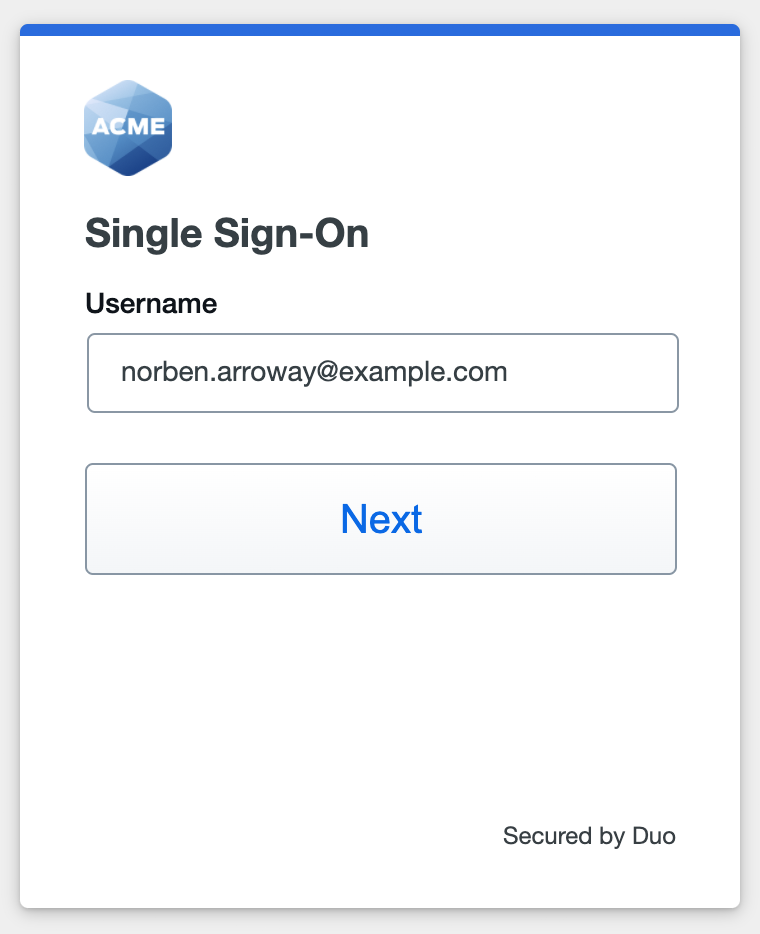
Enter the AD primary password and click or tap Log in to continue.
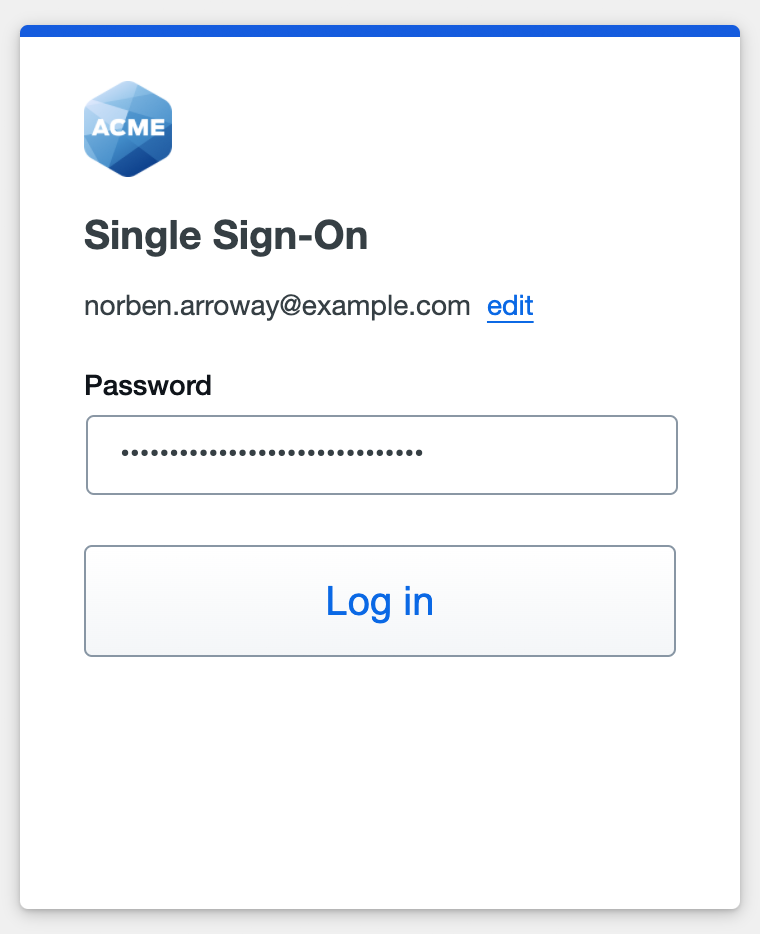
Enable Duo Passwordless to log in to Duo SSO backed by Active Directory authentication without entering a password in the future.
SAML Login
The SAML login experience depends on your Duo SSO routing rules configuration.
With another SAML identity provider as the only enabled Duo SSO authentication source and the default routing rule in place, Duo SSO immediately redirects the login attempt to that SAML IdP for primary authentication. Users do not see the Duo SSO primary login screen.
If you have multiple enabled SAML authentication sources or custom routing rules in place, then users enter their primary username (email address) on the Duo SSO login page and then will be redirected to the correct external SAML identity provider.
Duo Authentication
Successful verification of your primary credentials by Active Directory or a SAML IdP redirects back to Duo. Complete Duo two-factor authentication when prompted and then you'll return to Harness to complete the login process.
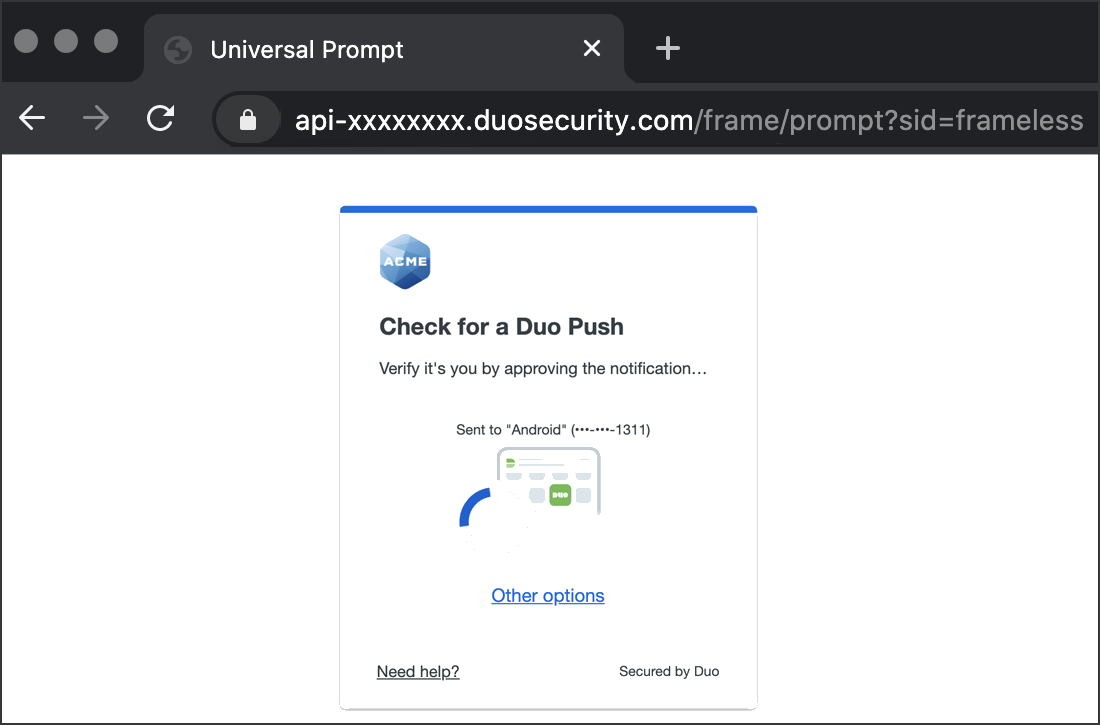
* Universal Prompt experience shown.
You can also log into Harness using Duo Central, our cloud-hosted portal which allows users to access all of their applications in one spot. Link to Harness in Duo Central by adding it as an application tile. Once the tile has been added, log into Duo Central and click the tile for IdP-initiated authentication to Harness.
Congratulations! Your Harness users now authenticate using Duo Single Sign-On.
See the full user login experience, including expired password reset (available for Active Directory authentication sources) in the Duo End User Guide for SSO.
Grant Access to Users
If you did not already grant user access to the Duo users you want to use this application be sure to do that before inviting or requiring them to log in with Duo.
Enable Remembered Devices
To minimize additional Duo two-factor prompts when switching between Harness and your other Duo Single Sign-On SAML applications, be sure to apply a shared "Remembered Devices" policy to your SAML applications.
Automated Provisioning
You may be able to create, manage, and delete users and groups in this application automatically from Duo using SCIM 2.0 provisioning. See Automated Provisioning to learn how.
Troubleshooting
Need some help? Try searching our Knowledge Base articles or Community discussions. For further assistance, contact Support.
